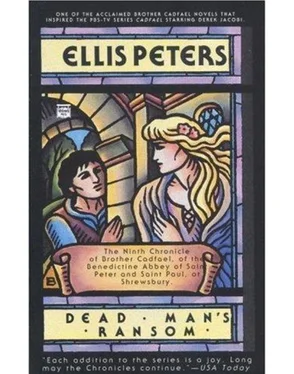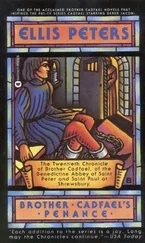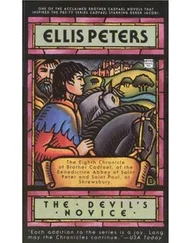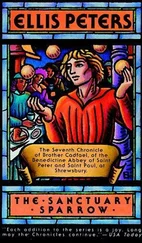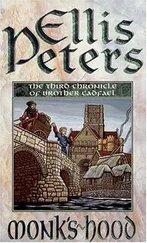“Barely a scratch. And he may have come by a measure of sense into the bargain. Sound as a well-cast bell, I promise you, and my mission is to offer an exchange with you, if by any chance your brother has taken among his prisoners one as valuable to us as Elis is to you. I am sent,” said Cadfael, “by Hugh Beringar of Maesbury, speaking for Shropshire, to ask of you the return of his chief and sheriff, Gilbert Prestcote. With all proper greetings and compliments to your lordship, and full assurance of our intent to maintain the peace with you as hitherto.”
“The time’s ripe for it,” acknowledged Owain drily, “and it’s to the vantage of both of us, things being as they are. Where is Elis now?”
“In Shrewsbury castle, and has the run of the wards on his parole.”
“And you want him off your hands?”
“No haste for that,” said Cadfael. “We think well enough of him to keep him yet a while. But we do want the sheriff, if he lives, and if you have him. For Hugh looked for him after the battle, and found no trace, and it was your brother’s Welsh who overran the place where he fought.”
“Bide here a night or two,” said the prince, “and I will send to Cadwaladr, and find out if he holds your man. And if so, you shall have him.”
There was harping after supper, and singing, and drinking of good wine long after the prince’s messenger had ridden out on the first stage of his long journey to Aberystwyth. There was also a certain amount of good-natured wrestling and horse-play between Owain’s young cockerels and the men of Cadfael’s escort, though Hugh had taken care to choose some who had Welsh kin to recommend them, no very hard task in Shrewsbury at any time.
“Which of all these,” asked Cadfael, surveying the hall, smoky now from the fire and the torches, and loud with voices, “is Eliud ap Griffith?”
“I see Elis has chattered to you as freely as ever,” said Owain smiling, “prisoner or no. His cousin and foster-brother is hovering this moment at the end of the near table, and eyeing you hard, waiting his chance to have speech with you as soon as I withdraw. The long lad in the blue coat.” No mistaking him, once noticed, though he could not have been more different from his cousin: such a pair of eyes fixed upon Cadfael’s face in implacable determination and eagerness and such a still, braced body waiting for the least encouragement to fly to respond. Owain, humouring him, lifted a beckoning finger, and he came like a lance launched, quivering. A long lad he was, and thin and intense, with bright hazel eyes in a grave oval face, featured finely enough for a woman, but with good lean bones in it, too. There was a quality of devotional anxiety about him that must be for Elis ap Cynan at this moment, but at another might be for Wales, for his prince, some day, no doubt, for a woman, but whatever its object it would always be there. This one would never be quite at rest.
He bent the knee eagerly to Owain, and Owain clouted him amiably on the shoulder and said: “Sit down here with Brother Cadfael, and have out of him everything you want to know. Though the best you know already, your other self is alive and can be bought back you at a price.” And with that he left them together and went to confer with Tudur.
Eliud sat down willingly and spread his elbows on the board to lean ardently close. “Brother, it is true, what Cristina told me? You have Elis safe in Shrewsbury? They came back without him… I sent to know, but there was no one could tell me where he went astray or how. I have been hunting and asking everywhere and so has the prince, for all he makes a light thing of it. He is my father’s fostering—you’re Welsh yourself, so you know. We grew up together from babes, and there are no more brothers, either side…”
“I do know,” agreed Cadfael, “and I say again, as Cristina said to you, he is safe enough, man alive and as good as new.”
“You’ve seen him? Talked to him? You’re sure it’s Elis and no other? A well-looking man of his company,” explained Eliud apologetically, “if he found himself prisoner, might award himself a name that would stead him better than his own…” Cadfael patiently described his man, and told over the whole tale of the rescue from the flooded brook and Elis’s obstinate withdrawal into the Welsh tongue until a Welshman challenged him. Eliud listened, his lips parted and his eyes intent, and was visibly eased into conviction.
“And was he so uncivil to those ladies who saved him? Oh, now I do know him for Elis, he’d be so shamed, to come back to life in such hands—like a babe being thumped into breathing!” No mistake, the solemn youth could laugh, and laughter lit up his grave face and made his eyes sparkle. It was no blind love he had for his twin who was no twin, he knew him through and through, scolded, criticised, fought with him, and loved him none the less. The girl Cristina had a hard fight on her hands. “And so you got him from the nuns. And had he no hurts at all, once he was wrung dry?”
“Nothing worse than a gash in his hinder end, got from a sharp rock in the brook, while he was drowning. And that’s salved and healed. His worst trouble was that you would be mourning him for dead, but my journey here eases him of that anxiety, as it does you of yours. No need to fret about Elis ap Cynan. Even in an English castle he is soon and easily at home.”
“So he would be,” agreed Eliud in the soft, musing voice of tolerant affection. “So he always was and always will be. He has the gift. But so free with it, sometimes I fret for him indeed!” Always, rather than sometimes, thought Cadfael, after the young man had left him, and the hall was settling down for the night round the turfed and quiet fire. Even now, assured of his friend’s safety and well-being, and past question or measure glad of that, even now he goes with locked brows and inward-gazing eyes. He had a troubled vision of those three young creatures bound together in inescapable strife, the two boys linked together from childhood, locked even more securely by the one’s gravity and the other’s innocent rashness, and the girl betrothed in infancy to half of an inseparable pair. Of the three the prisoner in Shrewsbury seemed to him the happiest by far, since he lived in the day, warming in its sunlight, taking cover from its storms, in every case finding by instinct the pleasant corner and the gratifying entertainment. The other two burned like candles, eating their own substance and giving an angry and vulnerable light.
He said prayers for all three before he slept, and awoke in the night to the uneasy reflection that somewhere, shadowy as yet, there might be a fourth to be considered and prayed for.
The next day was clear and bright, with light frost that lost its powdery sparkle as soon as the sun came up; and it was pleasure to have a whole day to spend in his own Welsh countryside with a good conscience and in good company. Owain Gwynedd again rode out eastward upon another patrol with a half-dozen of his young men, and again came back in the evening well content. It seemed that Ranulf of Chester was lying low for the moment, digesting his gains.
As for Cadfael, since word could hardly be expected to come back from Aberystwyth until the following day, he gladly accepted the prince’s invitation to ride with them, and see for himself the state of readiness of the border villages that kept watch on England. They returned to the courtyard of Tudur’s maenol in the early dusk, and beyond the flurry and bustle of activity among the grooms and the servants, the hall door hung open, and sharp and dark against the glow of the fire and the torches within stood the small, erect figure of Cristina, looking out for the guests returning, in order to set all forward for the evening meal. She vanished within for a few moments only, and then came forth to watch them dismount, her father at her side.
Читать дальше
